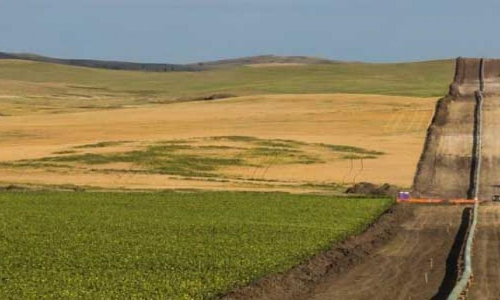Live
- Study Reveals Teabags Release Billions of Microplastics and Nanoplastics, Entering Your Body
- Kumbh Mela 2025: Essential Guide to Comfortable and Respectful Attire for Maha Kumbh
- Hyderabad Real Estate Faces Setback: Property Sales Drop 7% Year-on-Year in 2024
- Gnani’s Gen AI Solutions Revolutionising BFSI
- Trump's WHO threat sparks debate on the efficiency of global health governance
- ICC Champions Trophy 2025 Schedule: India vs Pakistan Match Set for February 23 in Dubai
- Champions Trophy 2025: Full Schedule, Match Dates, Venues, Timings, and Updates
- FRAI Urges Government to Provide Technology Platform for Kirana Stores to Stay Competitive
- Not just Gen Z, millennials too: Redditors discuss the wave of pet parenthood embraced by young Indians
- Innovation can expedite the journey to a Smoke-Free future- in focus at Technovation Abu Dhabi
Just In

The current scenario of global land scarcity is only expected to become bleaker given the increase of urbanization rates across the world accompanied by an increase in the demand for agricultural produce. This is expected to cause a multiplicative increase in the complexities associated with land use patterns. Gender aspects concerning equitable land access also become important from a poverty red
The current scenario of global land scarcity is only expected to become bleaker given the increase of urbanization rates across the world accompanied by an increase in the demand for agricultural produce. This is expected to cause a multiplicative increase in the complexities associated with land use patterns. Gender aspects concerning equitable land access also become important from a poverty reduction standpoint.
Women’s access to land becomes important since they are also increasingly being viewed as food producers. Households which are headed by women can benefit immensely through access to land. It can also result in increased income earning opportunities. From an economic standpoint as well, there seems to be a strong correlation between women’s land access and equity outcomes.
The World Bank is of the opinion that women’s control over land assets not only enhances their welfare and income earning capacity but also increases spending on food and on children’s health and education. At the same time, it could result in improved investment and access to the benefits of development, credit and increase in productivity.
Among the many agencies that deal with land are the DoLR of Ministry of Rural Development, the Ministry of Agriculture, the Ministry of Environment and Forests the state governments CAZRI, the (erstwhile) Planning Commission.
Land is a non-renewable resource base which supports all primary production systems as well as the essential social environment, in terms of shelter, communication, industries and other facilities. Land and water support plants and other living orgasms as well, replenishing surface and groundwater.
The physical, chemical and biological health of the soil profile determines the ability of land to serve socio – economic needs. The guiding principles of Land Resource planning in India has been self-reliance, particularly in food production, improved efficiency, productivity, equity and social justice.
At the international level, the World Soil Charter was adopted by the Food and Agriculture Organisation (FAO) of the United Nations 1981 and dealt with international cooperation for the most rational use of the world’s soil resources. Also, the World Soil Chatter?
Special attention is also called for the enunciation of a national land-use policy to create incentives for people to participate in soil conservation work and improve efficacy of land-use. Integrated thinking about the need for a land use policy started in 1972 pleading for raising the status of land-use in the national agenda particularly in the context of the fact that the Constitution made land a state subject. Prime Minister Indira Gandhi in 1972, said that.
The average land degradation in different states in the country stands at around 36.6 % of the total lands in the country . Available estimates also suggest that agricultural/cultivable land has marginally decreased from 185.2 million hectare in 1990-91 to 182.0 million hectare in 2012-13.
This necessitates the reconciliation of competing demands in a way that emphasizes sustainable development and dynamic conservatism at the same time without privileging development alone. Taken together, this calls for a pressing need for the effective use of available land resources in the country.
In India, tenancy reforms have been correlated with increases in agricultural growth and reductions in poverty along with a corresponding increase in social development. Increases in the number of small-scale land holdings have been correlated with increases in human development indicators in the country. In India, the trend now is one of liberalization of rental markets as a means of facilitating land access.
Principles of Land-use Planning
Land-use planning is the result of the work of many generations over centuries and be is largely the fruit of a process of trial and error. The existing pattern has developed through natural evolution in which past errors have been eliminated to some extent of consider misuse of land continues. Either wrongly used or not to the desired scale and or not contributing to the national well-being) and needs to be eliminated through planning.
Land-use planning helps determine optimum use of every bit of land. It changes with time, space and the prevailing economic setup and, therefore needs to be dynamic, and adaptable to changing conditions and habits of the people. The objective must, be national advantage rather than economic advantage of some groups of the community, able to satisfy the needs and legitimate desires of the people.
The two principles, which should dictate rational land-use planning are
i) The land should be used for the purposes for which it is well suited, and
ii) Land of high value for existing land-use should be protected against changes, which are difficult to reverse.

© 2024 Hyderabad Media House Limited/The Hans India. All rights reserved. Powered by hocalwire.com







